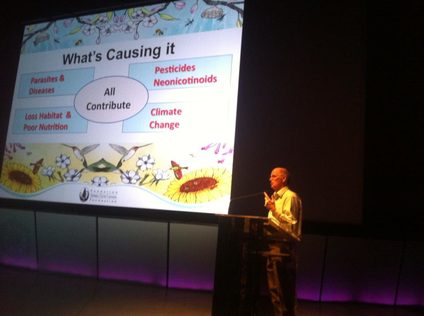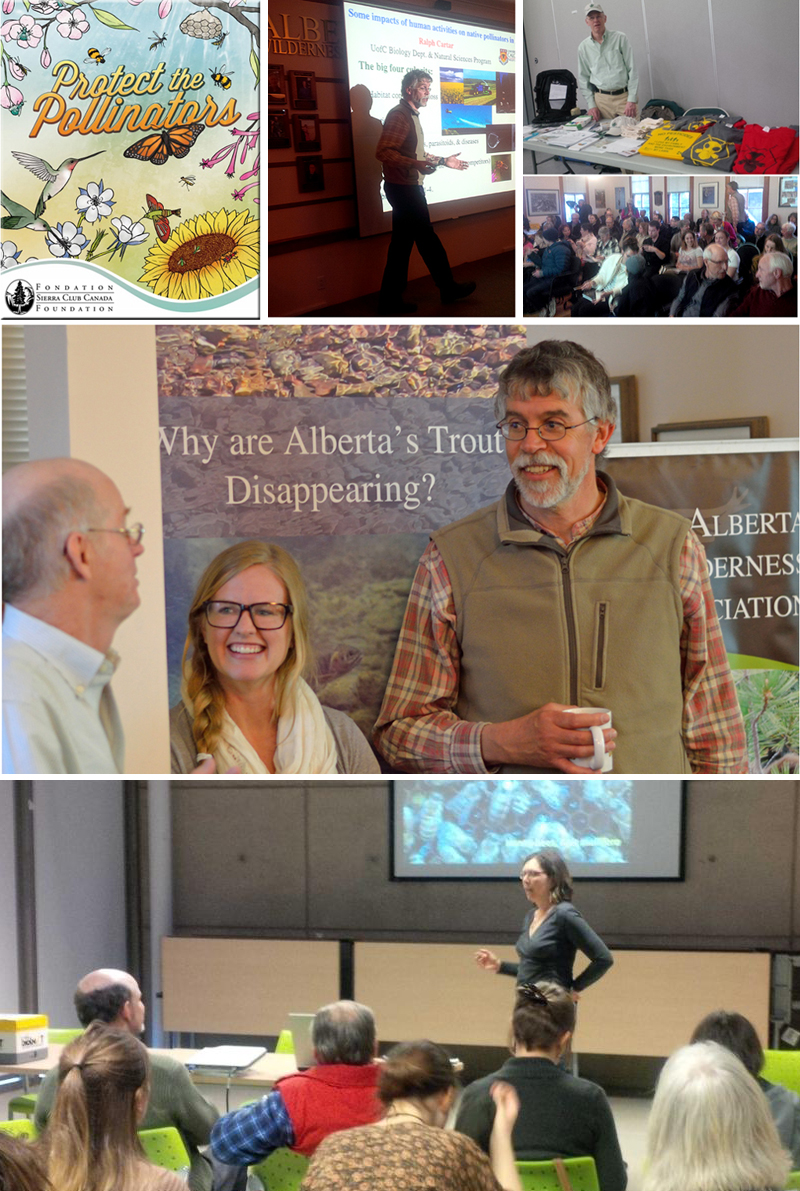
Dear friends:
I’m writing you from Niagara-on-the-Lake (overlooking vineyards) where I’m still on the road and still waiting for an elusive spring.
I hope you got a ‘rise’ out of last week's April Fool’s email.
PROTECTING POLLINATORS
It’s week four of the Protect The Pollinators Tour, which means our (unfortunate) comedy of errors is almost over. So far we have survived a broken tooth in the airport, two missed connections, a twisted ankle (I’m typing with my foot over my head) and one heck-of-a gruelling schedule. I am getting (at least feeling) old and, at this point, the thought of sitting in my office back in Ottawa is very, very nice!
But having said that, transportation mishaps and human folly aside, the tour has been an incredible success, and incredibly empowering and inspirational. I’m more hopeful today than I’ve been in a long while. Our force is strong.
 We’ve met wonderful people everywhere we went and we’ve been treated to some very impressive presentations by scientists, inner-city bee people, and pollinator garden groups.
We’ve met wonderful people everywhere we went and we’ve been treated to some very impressive presentations by scientists, inner-city bee people, and pollinator garden groups.
A lot of other things have been happening since we hit the road. Last week, Ontario implemented regulations to reduce the use of bee-killing neonicotinoid pesticides (neonics) by 80% in the province. You can submit your comments here (you might want to say you are disappointed with the limited nature of the new regulations…while the Ontario government withstood the lobbying efforts of CropLife, Bayer & Syngenta, beekeepers are concerned the regulations don’t go far enough asthey don’t apply to all neonic uses).
CLIMATE FORECAST
The vote on Bill C-51 is looming and it remains a threat to our freedom, but in the meantime momentum on climate change has been building.
The United States, respecting United Nations climate negotiations, submitted its proposed emission target on time (the Canadian government ignored the deadline). The U.S. is committing to reduce its emissions 28% below 2005 levels by 2025. It’s a moderate target, less than is both needed and achievable, but may be saleable in the Congress.
 Here in Canada, the real action on climate is at the provincial level. Next week in Quebec City, the Premiers are getting together for one of their annual gabfests. This time though, all the attention is on a national energy strategy.
Here in Canada, the real action on climate is at the provincial level. Next week in Quebec City, the Premiers are getting together for one of their annual gabfests. This time though, all the attention is on a national energy strategy.
TEXAS HOLD’EM
A few years back, former Alberta Premier Alison Redford made (what was at the time) an astounding proposal. Up to that point, suggesting any kind of “national” energy plan was like waving a red cape at a bull…political suicide for an Albertan. The cover story for the necessary strategy was, of course, dealing with the massive opposition to pipeline construction in Canada and how it would hurt Canada.
It’s not a surprise that Alberta suddenly called for urgent talks on a national strategy (i.e. the “please let us build our pipelines” tour). The ground shifted and Alberta was caught off guard. Provinces like B.C. were waking-up and starting to raise questions (and demand concessions). Alberta panicked.
For decades, Canada has been America’s biggest energy supplier, providing 16% of the market. Fracking has changed all that and the U.S. will soon be self-sufficient. The reality is, there will soon be zero need for Canadian dirty oil pipelines to the south, and the west and east are all about replacing lost markets. Alberta was (and still is) more concerned about losing its share of the U.S. oil market revenues—it’s all about the green backs. If Alberta’s Texan Keystone dream couldn’t be fulfilled, it wanted guaranteed access to B.C.’s fragile coastal waters (First Nations and Spirit Bears be damned).
CLIMATE LEADERSHIP WIN-WYNNE
To complicate things for Alberta, Ontario then elected Kathleen Wynn as Premier. She saw the “national energy strategy” as an opportunity to also create a “national climate strategy”. After all, energy and how we use itis the storyof climate change…it only made sense. Ontario has said it will adopt aggressive emission-reduction targets (supported by a cap on emissions) and the province has been working closely with Quebec and California to create a “sub-national” climate action plan. Make no mistake about it: Ontario has been a leader on climate change, filling a role long vacated by the federal government.
 Back to the gabfest…the last time Canadian premiers sat down to talk about something this serious, they came up with a new country called “Canada”. Part of the deal then was a ‘nation building’ railroad to British Columbia.
Back to the gabfest…the last time Canadian premiers sat down to talk about something this serious, they came up with a new country called “Canada”. Part of the deal then was a ‘nation building’ railroad to British Columbia.
When the premiers get to Quebec City this month, they’ll be greeted by a massive demonstration organized by numerous Canadian organizations demanding climate action and no pipelines.
The recent U.S. action on climate change, the Canadian public’s demand for climate action, and the feds hiding in Ottawa closets, adds up to a lot. The pressure is on and the public has expectations (for a group that rarely comes up with an agreement on anything).
So what’s going to happen? I don’t know. It could be historic…or another climate bust. I’m betting citizens won’t accept further inaction, but I could be wrong. History will soon tell.
BACK TO (FINANCIAL) REALITY
As I said in the opening, we're awaiting spring and with spring comes our spring fundraising and our membership drive. It’s time for our annual push to keep our doors open, bills paid and staff employed.
 I wanted to warn you in advance (sorry) that we’ll soon be assailing you with emails and letters for donations -- because we depend on you to do our work. However, there’s good news! You can avoid it all by renewing your membership now, today, or by simply making a one-time donation. You’ll be off our list and I promise we won’t bother you!
I wanted to warn you in advance (sorry) that we’ll soon be assailing you with emails and letters for donations -- because we depend on you to do our work. However, there’s good news! You can avoid it all by renewing your membership now, today, or by simply making a one-time donation. You’ll be off our list and I promise we won’t bother you!
In the meantime, fingers-crossed for the climate meetings in Quebec City and one more pollinator presentation…stay tuned!
Sincerely,
John Bennett, National Program Director Sierra Club Canada Foundation
Sierra Club Canada Foundation
1510-1 Nicholas Street
Ottawa, Ontario
K1N 7B7
jb@sierraclub.ca
John on Twitter / Bennett Blog

